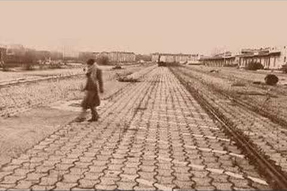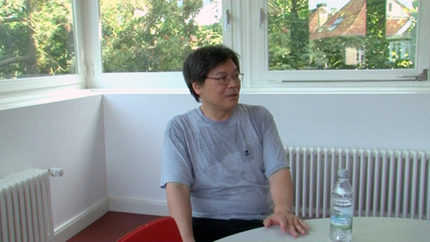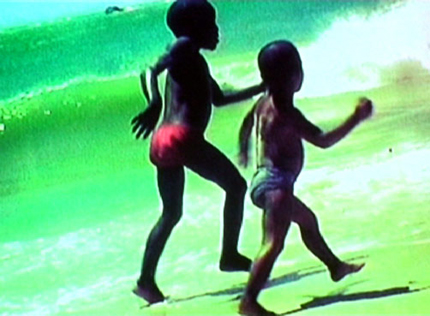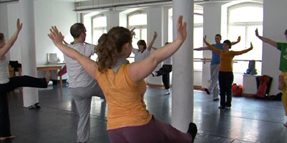
Christel Weiler, September 18, 2010
Under the title "The presence of the elsewhere in the now" ("Die Gegenwart des Anderswo im Jetzt"), the festival "Theaterformen", which took place in Braunschweig/Germany in June 2010, devoted a full weekend to debating issues of colonialism and racism. Within the context of this colloquium, which opened up diverse, partly conflicting perspectives on the topic’s complexity in talks, debates, performances and video installations, a dramaturgy of heterogeneity allowed visitors to carve their own itinerary amongst people and things. The following considerations should be understood as an initial ex post mapping of an individual path through events. In the process, lines are of necessity drawn to reading and theatre experiences that were and are relevant at other times and in other contexts. 

Kristin Flade, August 19, 2010
 Upon leaving the International Research Center "Interweaving Performance Cultures," Brian Singleton gave an interview in which he complicates terms like orientalism, interculturalism and interweaving. In Ariane Mnouchkine's performance Les Naufragés du Fol Espoir he perceives what he calls "an ethically conscious intercultural" he generally believes to not have happened yet.
Upon leaving the International Research Center "Interweaving Performance Cultures," Brian Singleton gave an interview in which he complicates terms like orientalism, interculturalism and interweaving. In Ariane Mnouchkine's performance Les Naufragés du Fol Espoir he perceives what he calls "an ethically conscious intercultural" he generally believes to not have happened yet. 
 Upon leaving the International Research Center "Interweaving Performance Cultures," Brian Singleton gave an interview in which he complicates terms like orientalism, interculturalism and interweaving. In Ariane Mnouchkine's performance Les Naufragés du Fol Espoir he perceives what he calls "an ethically conscious intercultural" he generally believes to not have happened yet.
Upon leaving the International Research Center "Interweaving Performance Cultures," Brian Singleton gave an interview in which he complicates terms like orientalism, interculturalism and interweaving. In Ariane Mnouchkine's performance Les Naufragés du Fol Espoir he perceives what he calls "an ethically conscious intercultural" he generally believes to not have happened yet. 
W. B. Worthen, August 18, 2010
 Since the late 1980s, Samuel Beckett's plays have come to epitomize the conflict at the heart of dramatic performance in the age of print: do we understand dramatic theatre, as Hans-Thies Lehmann puts it, as the "declamation and illustration of written drama" (21), or as a means for using writing in the production of an independent artwork, one agency among many in framing the theatrical event? …
Since the late 1980s, Samuel Beckett's plays have come to epitomize the conflict at the heart of dramatic performance in the age of print: do we understand dramatic theatre, as Hans-Thies Lehmann puts it, as the "declamation and illustration of written drama" (21), or as a means for using writing in the production of an independent artwork, one agency among many in framing the theatrical event? … 
 Since the late 1980s, Samuel Beckett's plays have come to epitomize the conflict at the heart of dramatic performance in the age of print: do we understand dramatic theatre, as Hans-Thies Lehmann puts it, as the "declamation and illustration of written drama" (21), or as a means for using writing in the production of an independent artwork, one agency among many in framing the theatrical event? …
Since the late 1980s, Samuel Beckett's plays have come to epitomize the conflict at the heart of dramatic performance in the age of print: do we understand dramatic theatre, as Hans-Thies Lehmann puts it, as the "declamation and illustration of written drama" (21), or as a means for using writing in the production of an independent artwork, one agency among many in framing the theatrical event? … 
Erika Fischer-Lichte, August 11, 2010
In this article Erika Fischer-Lichte argues that, since the beginning of the twentieth century, in different parts of the world, modern theatre was invented by way of interweaving cultures in performance. Different examples from the early twentieth century and the 1990s show how theatre acted as a laboratory for testing and experiencing the potential of cultural diversity. An innovative performance aesthetics enabled the exploration of the emergence, stabilization, and destabilization of cultural identity, merging aesthetics with politics. 

Kristin Flade, August 11, 2010
Ann-Christine Simke, July 7, 2010
Brian Singleton, July 1, 2010
The success of the German entry to the 2010 Eurovision Song Contest in Oslo was matched by stunning sales and chart positions in many countries throughout Europe. Having more Google hits than any of the contestants before the contest itself was a sure sign that the appeal of a German contest song was to a much broader European youth culture than a national boundary could contain. The song was produced by Stefan Raab, himself a former contest entrant as a writer, and now the producer of the German national contest. In a wrap-up event two days after Lena triumphed in Oslo, she guested on Raab’s night-time talk show which was frequently interrupted by the host (Raab) and guest (Lena) breaking into a football chant of ’Deutsch-e-land’ to celebrate only the second win for Germany in the 55 year history of the contest, a Cold War-era televisual phenomenon purporting to be apolitical and aiming for the promotion of a collective European identity. Also, in a succession of post-contest interviews it was strongly suggested by Raab that Lena should defend (verteidigen) her title, and thereby undeniably linking a song contest to a sporting contest, and in particular to the imminent World Cup soccer tournament in South Africa. In terms of the impact of popular culture, the World cup soccer tournament and the Eurovision Song Contest are the two biggest televisions shows in the world, both televisual spectacle for competitive and competing nationalisms. 

Daryl Chin, June 29, 2010
When I was growing up, there were certain books which really galvanized me, making me think that critical writing was as richly evocative as any other kind of writing. One such book was Susan Sontag's "Against Interpretation"; it was so inspiring that I rushed out to get her second collection of essays, "Styles of Radical Will", the minute it was published. (I still have the hardcover, though the jacket has long since disintegrated.) But then I read her novels, "The Benefactor" and "Death Kit", and I was stumped. I couldn't understand how someone with such a keen, critical mind could turn out such ... crap. Soon after, I remember reading Gore Vidal's review of her novels in "The New York Review of Books", in which he explained how the analytic sense and the intellectual enthusiasm, which made Sontag such a formidable essayist, were not the same as the imaginative and emotional qualities needed for a novelist. He noted that Sontag was one of the few American writers well-acquainted with the most recent developments in European literature, but ticking off the influences (a little Sarraute here, a dollop of Robbe-Grillet there, Tomasso Landolfi coming in during the final stretch) wasn't the same as being transported into the imaginative realm of the aesthetic. 

Kristin Flade, June 20, 2010
 A group of scholars and Ph.D. students from Freie Universität Berlin went to Israel in February 2010 for the concluding session of the three-year long project Poetics and Politics of the Future. During their stay they encountered inspiring colleagues, and saw performances both culturally and socially different from what they may have been used to. Here is a collection of four personal reflections on their experiences 'encountering Israel.'
A group of scholars and Ph.D. students from Freie Universität Berlin went to Israel in February 2010 for the concluding session of the three-year long project Poetics and Politics of the Future. During their stay they encountered inspiring colleagues, and saw performances both culturally and socially different from what they may have been used to. Here is a collection of four personal reflections on their experiences 'encountering Israel.' 
 A group of scholars and Ph.D. students from Freie Universität Berlin went to Israel in February 2010 for the concluding session of the three-year long project Poetics and Politics of the Future. During their stay they encountered inspiring colleagues, and saw performances both culturally and socially different from what they may have been used to. Here is a collection of four personal reflections on their experiences 'encountering Israel.'
A group of scholars and Ph.D. students from Freie Universität Berlin went to Israel in February 2010 for the concluding session of the three-year long project Poetics and Politics of the Future. During their stay they encountered inspiring colleagues, and saw performances both culturally and socially different from what they may have been used to. Here is a collection of four personal reflections on their experiences 'encountering Israel.' 
Kristin Flade, June 17, 2010










